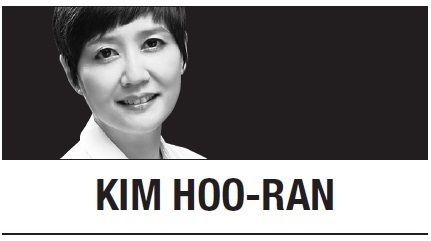Yes, I have finally found someone who understands what it is like to live with a heightened sense of smell, I thought, watching Bong Joon-ho’s “Parasite.”
I felt vindicated about my irritation at being hit with the sharp, pungent smell of kimchi upon opening the fridge, the boxes of odor-absorbing baking soda apparently past their expiration date. The agitation of waking up to the acrid smell of cigarette smoke wafting in through the window, thanks to an unconscionable neighbor who -- same time, every morning -- lights up despite living in a nonsmoking apartment building. Then there is the stink of the old sewer system in the neighborhood where my office is located.
The earlier feeling of camaraderie with the characters who went around sniffing quickly dissipated, turning to shame and embarrassment when I realized that odor was employed to mark classes.
The poor Kims are said to have a particular odor. The patriarch of the rich Park family describes his driver, the Kim patriarch, as having a “subway odor,” implicitly proposing that the masses who ride the subway have a distinctive, unpleasant smell.
I began squirming in my seat, forced to face my own prejudices. As I began questioning whether I, too, discriminated based on smell, the movie suddenly became very uncomfortable. “Parasite” had gotten under my skin. The unease lasted for days.
And therein lies the brilliance of Bong and the power of his films. The director has an uncanny ability to expose our weaknesses, our demons, forcing us to confront our inconvenient truths.
There were those who found the truths exposed by Bong too inconvenient. The inept investigation by incompetent detectives in “Memories of Murder” (2003), based on real-life serial killings that occurred in the mid-1980s to early 1990s, surely irked the authorities. When a man imprisoned for another murder confessed to the serial killings last year and another man, who had been sentenced to life and released on parole after 20 years, claimed that he had been wrongfully convicted of one of the killings, people recalled the film.
“The Host” (2006) came out at a time when there was much public outrage about soil contamination on US military bases. It was inevitable that the critics would regard the film -- featuring a mutant monster resulting from chemicals dumped into the river by the US military -- as fanning anti-American sentiment.
“Snowpiercer” (2013), set in an ice age caused by climate change, is an unabashed depiction of class struggle, the exploited lower class assigned to the end of the train fighting its way to the front occupied by the ruling class.
So great was the discomfort felt by the Park Geun-hye administration with Bong’s work that the director was blacklisted.
The inconvenient truths exposed by Bong cut across political lines. The current administration must have at least winced, recalling a scene where Kim’s daughter forges a university enrollment certificate that her brother uses to get a tutoring position with the Park family. The scene bears eerie similarity to the forged documents scandal involving former Justice Minister Cho Kuk and his children that would unfold several months after the film’s May release. The problems of the growing social divide, youth unemployment and skyrocketing housing costs are laid bare for the world to see.
Had it not amassed so many international awards, including the landslide win at the Oscars, where it made history as the first non-English-language film to win the best film award, who can tell how this administration might have reacted to “Parasite”?
Drunk in Oscar glory and eager to exploit Bong’s achievements for their own ends, politicians of all colors and stripes are proposing a proper commemoration for the new national hero: rebuilding the house where Bong was born, a museum dedicated to Bong, a museum dedicated to actor Song Kang-ho. The list goes on and on and on.
Rather than pledging yet another “Parasite”-related project, they ought to watch “Parasite,” again if they have done so already. Be disturbed by the inconvenient truths staring you in the face and feel such great unease that you do something about them.
By Kim Hoo-ran (
khooran@heraldcorp.com)
The writer is culture desk editor at The Korea Herald. -- Ed.








